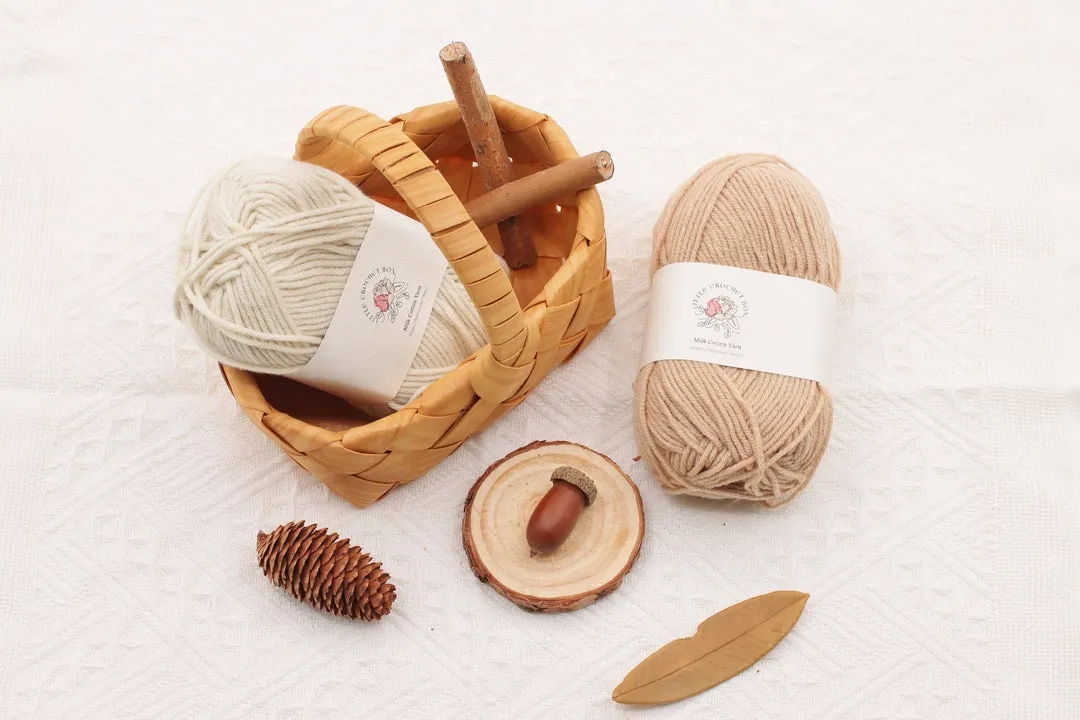
What is Milk Cotton Yarn: Understanding its Uses and Benefits
|
|
Time to read 6 min
|
|
Time to read 6 min
Milk cotton yarn has emerged as a popular choice among crafters and knitters due to its unique properties and versatility. This innovative yarn, made from a blend of milk protein (casein) and cotton fibers, offers a range of benefits that make it suitable for various projects. In this article, we will explore what milk cotton yarn is, how it is made, its benefits, common uses, caring for milk cotton yarn projects, and frequently asked questions to help you understand this remarkable material.
Milk cotton yarn is a semi-synthetic yarn that combines milk protein and cotton fibers to create a soft, durable, and luxurious material. The name "milk cotton" derives from the casein protein extracted from milk, which is then blended with cotton fibers. This unique combination results in a yarn that is not only soft and smooth but also possesses a natural sheen, making it visually appealing for various projects.
Characteristics of Milk Cotton Yarn
The production of milk cotton yarn involves several steps that transform milk protein into a usable yarn. Here’s a closer look at the process:
The first step in creating milk cotton yarn is the extraction of casein from milk. This process typically involves the following:
Once the casein is extracted and processed, it is blended with cotton fibers to create the final yarn product. The blending process typically involves:
After spinning, the milk cotton yarn undergoes a finishing process to enhance its properties. This may include treatments to improve colorfastness, softness, and overall quality. The finished yarn is then wound into skeins or balls, ready for distribution and use in crafting projects.
Milk cotton yarn offers a range of benefits that make it a preferred choice for many crafters. Here are some of the key advantages:
1. Exceptional Softness: Milk cotton yarn is renowned for its silky, plush texture that is gentle against the skin. This softness makes it an excellent choice for items that will be worn close to the body, such as baby clothes, blankets, and delicate accessories.
2. Hypoallergenic Properties: Due to the presence of casein, milk cotton yarn is less likely to cause allergic reactions, making it suitable for individuals with sensitive skin. This quality is particularly beneficial for crafting baby items, ensuring comfort and safety for infants.
3. Moisture Absorbency: Milk cotton yarn effectively absorbs moisture, enhancing comfort during warm weather or physical exertion. This moisture-wicking property helps keep the wearer dry and comfortable, making it ideal for summer garments.
4. Durability: When properly cared for, milk cotton yarn products are noted for their resilience and longevity. The strength of the casein fibers contributes to the overall durability of the yarn, allowing projects to withstand regular use.
5. Easy Care: Garments made from milk cotton yarn are generally machine washable and maintain their shape and color well. This ease of care makes it a practical choice for everyday items, as crafters can enjoy their creations without worrying about complicated maintenance.
6. Eco-Friendly: The production of milk cotton yarn utilizes waste milk, contributing to a more sustainable textile industry. By repurposing materials that would otherwise be discarded, milk cotton yarn offers an eco-friendly alternative to traditional yarns.
Proper care is essential to maintain the look and feel of items made with milk cotton yarn. Here are some tips on how to care for your milk cotton projects:
1. Washing: Most milk cotton yarns can be machine washed on a gentle cycle with cold water. However, always check the care instructions on the yarn label, as some blends may require hand washing.
2. Drying: It is best to lay items flat to dry to prevent stretching and maintain their shape. Avoid hanging, as the weight of the wet fabric can distort the fibers.
3. Avoid High Heat: Do not use high heat when washing or drying, as it can damage the protein fibers. Avoid using bleach or harsh detergents.
4. Storage: Store your milk cotton projects in a cool, dry place away from direct sunlight to preserve their color and quality.
1. What is the difference between milk cotton yarn and regular cotton yarn?
Milk cotton yarn is made from a blend of milk protein (casein) and cotton fibers, while regular cotton yarn is made solely from the fibers of the cotton plant. Milk cotton yarn offers additional softness, hypoallergenic properties, and moisture-wicking abilities compared to regular cotton yarn.
2. Can I use milk cotton yarn for all types of projects?
While milk cotton yarn is suitable for many projects, its slight elasticity may limit its suitability for patterns requiring firm, rigid shapes. It is best for soft, drapey items like garments, accessories, and baby items.
3. How do I care for milk cotton yarn?
To care for items made from milk cotton yarn, hand wash them in cold water using a mild detergent. Air dry flat to maintain their shape, and avoid wringing out the fabric. If necessary, iron on a low heat setting with a pressing cloth.
4. Is milk cotton yarn environmentally friendly?
Yes, milk cotton yarn is considered eco-friendly because it repurposes waste milk that would otherwise be discarded. The production process is less wasteful than other fiber-producing methods, making it a sustainable option for crafters.
5. Where can I buy milk cotton yarn?
Milk cotton yarn is available at various online and local craft stores. Popular platforms like Amazon, eBay, and specialty yarn shops often carry a selection of milk cotton yarn in different colors and weights. Be sure to check product details and reviews before purchasing to ensure quality.


